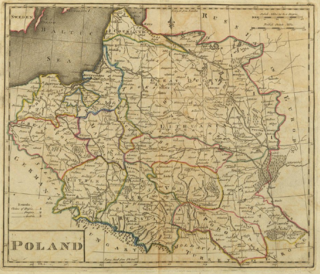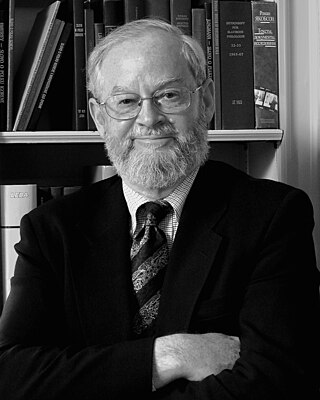
The Glagolitic script is the oldest known Slavic alphabet. It is generally agreed that it was created in the 9th century by Saint Cyril, a monk from Thessalonica. He and his brother Saint Methodius were sent by the Byzantine Emperor Michael III in 863 to Great Moravia to spread Christianity among the West Slavs in the area. The brothers decided to translate liturgical books into the contemporary Slavic language understandable to the general population, and Cyril decided to invent a new script, Glagolitic, which he based on the local dialect of the Slavic tribes from around Thessalonica. After the deaths of Cyril and Methodius, the Glagolitic alphabet ceased to be used in Moravia for political or religious needs.

Polish is a West Slavic language of the Lechitic group within the Indo-European language family written in the Latin script. It is spoken primarily in Poland and serves as the native language of the Poles. In addition to being the official language of Poland, it is also used by the Polish diaspora. There are over 50 million Polish speakers around the world. It ranks as the sixth most-spoken among languages of the European Union. Polish is subdivided into regional dialects and maintains strict T–V distinction pronouns, honorifics, and various forms of formalities when addressing individuals.

The Slavic languages, also known as the Slavonic languages, are Indo-European languages spoken primarily by the Slavic peoples and their descendants. They are thought to descend from a proto-language called Proto-Slavic, spoken during the Early Middle Ages, which in turn is thought to have descended from the earlier Proto-Balto-Slavic language, linking the Slavic languages to the Baltic languages in a Balto-Slavic group within the Indo-European family.
V, or v, is the 22nd letter in the Latin alphabet, used in the modern English alphabet, the alphabets of other western European languages and others worldwide. Its name in English is vee, plural vees.
W, or w, is the 23rd letter of the Latin alphabet, used in the modern English alphabet, the alphabets of other western European languages and others worldwide. It represents a consonant, but in some languages it represents a vowel. Its name in English is double-u, plural double-ues.

A given name is the part of a personal name that identifies a person, potentially with a middle name as well, and differentiates that person from the other members of a group who have a common surname. The term given name refers to a name usually bestowed at or close to the time of birth, usually by the parents of the newborn. A Christian name is the first name which is given at baptism, in Christian custom.
An anglicism is a word or construction borrowed from English by another language.

The Tale of Igor's Campaign or The Tale of Ihor's Campaign is an anonymous epic poem written in the Old East Slavic language. The title is occasionally translated as The Tale of the Campaign of Igor, The Song of Igor's Campaign, The Lay of Igor's Campaign, The Lay of the Host of Igor, and The Lay of the Warfare Waged by Igor.
Russian is an East Slavic language of the Indo-European family. All Indo-European languages are descendants of a single prehistoric language, reconstructed as Proto-Indo-European, spoken sometime in the Neolithic era. Although no written records remain, much of the culture and religion of the Proto-Indo-European people can also be reconstructed based on their daughter cultures traditionally and continuing to inhabit most of Europe and South Asia, areas to where the Proto-Indo-Europeans migrated from their original homeland.
Ch is a digraph in the Latin script. It is treated as a letter of its own in the Chamorro, Old Spanish, Czech, Slovak, Igbo, Uzbek, Quechua, Ladino, Guarani, Welsh, Cornish, Breton, Ukrainian Latynka and Belarusian Łacinka alphabets. Formerly ch was also considered a separate letter for collation purposes in Modern Spanish, Vietnamese, and sometimes in Polish; now the digraph ch in these languages continues to be used, but it is considered as a sequence of letters and sorted as such.
L-vocalization, in linguistics, is a process by which a lateral approximant sound such as, or, perhaps more often, velarized, is replaced by a vowel or a semivowel.
Polish orthography is the system of writing the Polish language. The language is written using the Polish alphabet, which derives from the Latin alphabet, but includes some additional letters with diacritics. The orthography is mostly phonetic, or rather phonemic—the written letters correspond in a consistent manner to the sounds, or rather the phonemes, of spoken Polish. For detailed information about the system of phonemes, see Polish phonology.
Bohemistics, also known as Czech studies, is the field of humanities that researches, documents and disseminates Czech language and literature in both its historic and present-day forms. The common Czech name for the field is bohemistika. A researcher in the field is usually called a "Bohemist".
Giacomo Micaglia, was an Italian linguist and lexicographer, of Slavic ancestry. He was born in the town of Peschici (Apulia), at that time under the Kingdom of Naples. He said about himself to be "an Italian of Slavic language".

The ethnonyms for the Poles (people) and Poland include endonyms and exonyms. Endonyms and most exonyms for Poles and Poland derive from the name of the West Slavic tribe of Polans (Polanie), while in some languages the exonyms for Poland to derive from the name of another tribe – the Lendians (Lędzianie).

Edward Louis "Ned" Keenan Jr. was an American professor of history at Harvard University who specialized in medieval Russian history. He became a prominent and controversial figure after conducting various studies that analyzed and ultimately disproved the authenticity of major resources in East Slavic history. Two of his books argue that two texts were not medieval at all, but seventeenth- and eighteenth-century, respectively: The Kurbskii-Groznyi Apocrypha: The Seventeenth-century Genesis of the "Correspondence" Attributed to Prince A. M. Kurbskii and Tsar Ivan IV (1971), and Joseph Dobrovsky and the Origins of the "Igor Tale" (2003) He eventually became one of the world's leading experts on medieval Russian history. He also wrote a number of seminal articles.
Slavicisms or Slavisms are words and expressions borrowed or derived from Slavic languages.






